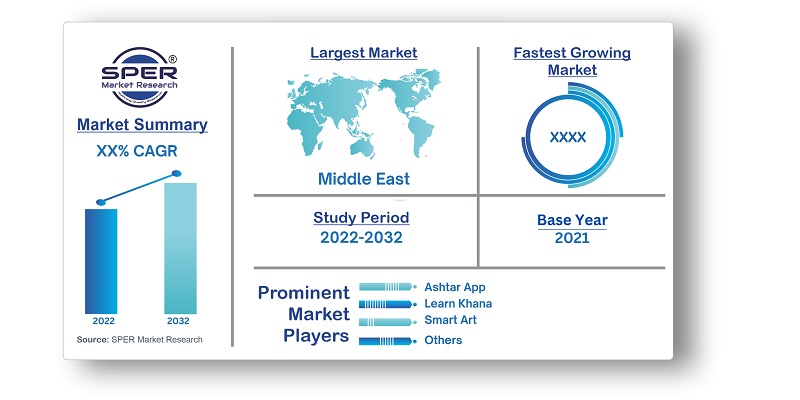
Egypt E-Learning Market Growth, Revenue, Share, Competition and Future Trends 2032
Egypt E-Learning Market Size- By K-12 and Pre K-12 E-Learning, By Post K-12 E-Learning, By Language and Casual E-learning, By End User, By Learning Management System- Regional Outlook, Competitive Strategies and Segment Forecast to 2032
| Published: Feb-2023 | Report ID: EDUI2302 | Pages: 1 - 102 | Formats*: |
| Category : Education Industry | |||

-010472224012023.jpg)
| Report Metric | Details |
| Market size available for years | 2019-2032 |
| Base year considered | 2021 |
| Forecast period | 2022-2032 |
| Segments covered | By K-12 and Pre K-12 E-Learning, By Post K-12 E-Learning, By Language and Casual E-learning, By End User, By Learning Management System |
| Regions covered | The Eastern Egypt, The Nile valley and delta, The Sinai Peninsula, The Western Egypt |
| Companies Covered | Abwaab, Akhdar, Ashtar App, Darisni, Edraak, Eduact, Hadotopia, Ideasgym, Joinivy, Korras, Learn Khana, Meduo, Nafham, Noon Academy, Selah Wltelmeez, Smart Art, Vidukation, Waza Academy, Zedny |
- Paid
- Free
- Paid
- Free
- Type of Languages
- English
- French
- German
- Others
- Educational Institutes
- Private Companies
- Number of Schools
- Type of End User
- The Nile valley and delta
- The Eastern Egypt
- The Western Egypt
- The Sinai Peninsula
- Size of Egypt E-Learning Market (FY’2019-FY’2032)
- Overview of Egypt E-Learning Market
- Segmentation of Egypt E-Learning Market By K-12 and Pre K-12 E-Learning (Paid, Free)
- Segmentation of Egypt E-Learning Market By Post K-12 E-Learning (Paid, Free)
- Segmentation of Egypt E-Learning Market By Language and Casual E-learning (Type of Subscribers, Number of Subscribers, Type of Languages)
- Segmentation of Egypt E-Learning Market By End User (Educational Institutes, Private Companies)
- Segmentation of Egypt E-Learning Market By Learning Management System (Number of Schools, Type of End User)
- Statistical Snap of Egypt E-Learning Market
- Growth Analysis of Egypt E-Learning Market
- Problems and Challenges in Egypt E-Learning Market
- Competitive Landscape in the Egypt E-Learning Market
- Impact of COVID-19 and Demonetization on Egypt E-Learning Market
- Details on Recent Investment in Egypt E-Learning Market
- Competitive Analysis of Egypt E-Learning Market
- Major Players in the Egypt E-Learning Market
- SWOT Analysis of Egypt E-Learning Market
- Egypt E-Learning Market Future Outlook and Projections (FY’2019-FY’2032)
- Recommendations from Analyst
1.1. Scope of the report1.2. Market segment analysis
2.1 Research data source
2.1.1 Secondary data2.1.2 Primary data2.1.3 SPER’s internal database2.1.4 Premium insight from KOL’s
2.2 Market size estimation
2.2.1 Top-down and Bottom-up approach
2.3 Data triangulation
4.1. Driver, Restraint, Opportunity, and Challenges analysis
4.1.1 Drivers4.1.2 Restraints4.1.3 Opportunities
4.1.4 Challenges
4.2. COVID-19 Impacts of the Egypt E-Learning Market
5.1. SWOT analysis
5.1.1 Strengths5.1.2 Weaknesses5.1.3 Opportunities5.1.4 Threats
5.2. PESTEL analysis
5.2.1 Political landscape5.2.2 Economic landscape5.2.3 Social landscape5.2.4 Technological landscape5.2.5 Environmental landscape5.2.6 Legal landscape
5.3. PORTER’S five forces analysis
5.3.1 Bargaining power of suppliers5.3.2 Bargaining power of Buyers5.3.3 Threat of Substitute5.3.4 Threat of new entrant5.3.5 Competitive rivalry
5.4. Heat map analysis
6.1. Egypt E-Learning Base Distribution, Sales Area, Product Type6.2. Mergers & Acquisitions, Partnerships, Product Launch, and Collaboration in Egypt E-Learning Market
7.1. Paid7.2. Free
8.1. Paid8.2. Free
9.1. Type of Subscribers
9.1.1. Paid9.1.2. Free
9.2. Number of Subscribers9.3. Type of Languages
9.3.1. English9.3.2. French9.3.3. German9.3.4. Others
10.1. Educational Institutes10.2. Private Companies
11.1. Number of Schools11.2. Type of End User
12.1. Egypt E-Learning Market Size and Market Share by Region (2019-2025)12.2. Egypt E-Learning Market Size and Market Share by Region (2026-2032)12.3. The Nile valley and delta12.4. The Eastern Egypt12.5. The Western Egypt12.6. The Sinai Peninsula
13.1. Abwaab
13.1.1. Company details13.1.2. Financial outlook13.1.3. Product summary13.1.4. Recent developments
13.2. Akhdar
13.2.1. Company details13.2.2. Financial outlook13.2.3. Product summary13.2.4. Recent developments
13.3. Ashtar App
13.3.1. Company details13.3.2. Financial outlook13.3.3. Product summary13.3.4. Recent developments
13.4. Darisni
13.4.1. Company details13.4.2. Financial outlook13.4.3. Product summary13.4.4. Recent developments
13.5. Edraak
13.5.1. Company details13.5.2. Financial outlook13.5.3. Product summary13.5.4. Recent developments
13.6. Eduact
13.6.1. Company details13.6.2. Financial outlook13.6.3. Product summary13.6.4. Recent developments
13.7. Hadotopia
13.7.1. Company details13.7.2. Financial outlook13.7.3. Product summary13.7.4. Recent developments
13.8. Ideasgym
13.8.1. Company details13.8.2. Financial outlook13.8.3. Product summary13.8.4. Recent developments
13.9. Joinivy
13.9.1. Company details13.9.2. Financial outlook13.9.3. Product summary13.9.4. Recent developments
13.10. Korras
13.10.1. Company details13.10.2. Financial outlook13.10.3. Product summary13.10.4. Recent developments
13.11. Learn Khana
13.11.1. Company details13.11.2. Financial outlook13.11.3. Product summary13.11.4. Recent developments
13.12. Meduo
13.12.1. Company details13.12.2. Financial outlook13.12.3. Product summary13.12.4. Recent developments
13.13. Nafham
13.13.1. Company details13.13.2. Financial outlook13.13.3. Product summary13.13.4. Recent developments
13.14. Noon Academy
13.14.1. Company details13.14.2. Financial outlook13.14.3. Product summary13.14.4. Recent developments
13.15. Selah Wltelmeez
13.15.1. Company details13.15.2. Financial outlook13.15.3. Product summary13.15.4. Recent developments
13.16. Smart Art
13.16.1. Company details13.16.2. Financial outlook13.16.3. Product summary13.16.4. Recent developments
13.17. Vidukation
13.17.1. Company details13.17.2. Financial outlook13.17.3. Product summary13.17.4. Recent developments
13.18. Waza Academy
13.18.1. Company details13.18.2. Financial outlook13.18.3. Product summary13.18.4. Recent developments
13.19. Zedny
13.19.1. Company details13.19.2. Financial outlook13.19.3. Product summary13.19.4. Recent developments
SPER Market Research’s methodology uses great emphasis on primary research to ensure that the market intelligence insights are up to date, reliable and accurate. Primary interviews are done with players involved in each phase of a supply chain to analyze the market forecasting. The secondary research method is used to help you fully understand how the future markets and the spending patterns look likes.
The report is based on in-depth qualitative and quantitative analysis of the Product Market. The quantitative analysis involves the application of various projection and sampling techniques. The qualitative analysis involves primary interviews, surveys, and vendor briefings. The data gathered as a result of these processes are validated through experts opinion. Our research methodology entails an ideal mixture of primary and secondary initiatives.



Frequently Asked Questions About This Report
PLACE AN ORDER
Year End Discount
Sample Report
Pre-Purchase Inquiry
NEED CUSTOMIZATION?
Request CustomizationCALL OR EMAIL US
100% Secure Payment






Related Reports
Our Global Clients
Our data-driven insights have influenced the strategy of 200+ reputed companies across the globe.




















